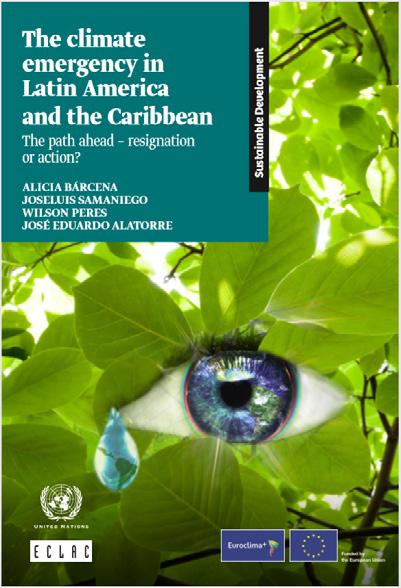
4 minute read
The role of climate action in recovering from the COVID-19 crisis
ECLAC launches new book on climate change and post-COVID-19 recovery
The response to the coronavirus pandemic (COVID-19) is an opportunity to move towards a big push for sustainability. What is needed is a deep transformation in the development paradigm and in the investment that make it possible, since the environmental impact of the prevailing development pattern endangers the wellbeing of much of humankind and, in some cases, its survival.
This message is at the center of a new book published by ECLAC Caribbean on 18 June 2020, which comprehensively the effects of climate change in Latin America and the Caribbean (LAC) and the policies addressing it The publication dedicates a special chapter to the cases of Central America and the Caribbean, two subregions that stand out because of their high degree of vulnerability to climate change and their limited participation in producing emissions, and which have climatic, geographic and socioeconomic particularities that require separate analysis. In the case of the Caribbean, the document analyzes ECLAC’s debt for climate adaptation swap initiative.
Entitled `The climate emergency in Latin America and the Caribbean: The path ahead – resignation or action?’, the book was presented by ECLAC Executive Secretary, Alicia Bárcena, at a virtual conference which saw the active participation of senior climate change decision makers. These included Kishan Kumarsingh, Head of the Multilateral Environmental Agreements Unit of the Ministry of Planning and Development of Trinidad and Tobago and Co-Chair of the Ad Hoc Working Group on the Durban Platform for Enhanced Action; Teresa Ribera, the Fourth Vice-President of the Government of Spain and Minister for the Ecological Transition and Demographic Challenge; Horst Pilger, Head of the Climate Change and Environment Section at the European Commission’s Directorate-General for International Cooperation and Development; and Alfonso de Urresti, Chair of the Environment and National Assets Commission in the Chilean Senate.
António Guterres, the United Nations Secretary-General, also sent a message for the occasion. “The study that ECLAC is presenting today reflects more than a decade of research, follow-up and proposal building. It articulates a perspective from the regional level with the biggest global challenge of our time, climate change; and, as always, it does so by gathering together countries’ own assessments, their needs, and tracking their own responses, while also imagining and proposing more ambitious paths for action and revealing the urgency of providing greater responses,” the UN SecretaryGeneral stated.
Guterres further added that “this book contributes notably to available knowledge, both for those in charge of designing and executing public policies as well as for our societies as a whole, which are essential protagonists in the change to production and consumption patterns that cannot be delayed any longer.”
The book indicates that the current health and climate crises are part of an unsustainable development model associated with a declining growth rate for production and trade, since even before this crisis, a recessionary bias and the decoupling of the financial system could be seen.
In light of this, the publication proposes actions for a new, more sustainable and egalitarian development model, in line with the long-term vision of ECLAC and the 2030 Agenda. In addition, it sets out essential guidelines for reactivating with equality and sustainability.
In this regard, Alicia Bárcena emphasized that in the face of the now unavoidable effects of climate change, one of the region’s priorities is to increase society’s resilience and adaptive capacity, while also exploring the existing synergies between adaptation processes and other development goals. Moreover, she noted that Latin America and the Caribbean has assumed adaptation and mitigation commitments that will be impossible to fulfill without structural change.
To this end, the ECLAC publication identifies policies for strategic sectors that reduce emissions, create jobs and boost investment, and would allow for undertaking the reactivation with equity and sustainability to move towards a new development pattern.

Antigua Training Taxi Operators on New Protocols
The advent of the global COVID-19 pandemic has had significant implication for the entire Caribbean tourism industry, including the on-island transportation industry, which has to adopt a range of new practices to safeguard both visitors and workers in the industry.
Officials in Antigua and Barbuda have begun training sessions for taxi operators focused on passenger safety and “minimizing occupational health risks.”
The program provides taxi drivers with information about the novel coronavirus, how it is transmitted and what is expected of drivers to “minimize their risk of infection, and protocols they are expected to follow to protect their passengers,” the Antigua and Barbuda Ministry of Tourism has advised.
“The taxi operators and their passengers are required to wear masks at all times and we are insisting that the operators clean and disinfect their vehicles as often as possible especially after dropping off passengers and we want them to pay close attention to surfaces that are touched often by passengers and sanitize after each trip in preparation for the next passenger,” said Dr. Adelle Blaire, Sustainable Tourism Officer within the Ministry of Tourism and Investment and Liaison Officer for the National Office of Disaster Services in the Tourism Ministry.
Antigua is training some 280 taxi operators who operate at the island’s airport and at hotels across the island.
“We want our guests to feel comfortable and at ease knowing protocols are being followed while they are being transported”, Dr. Blair Said.







